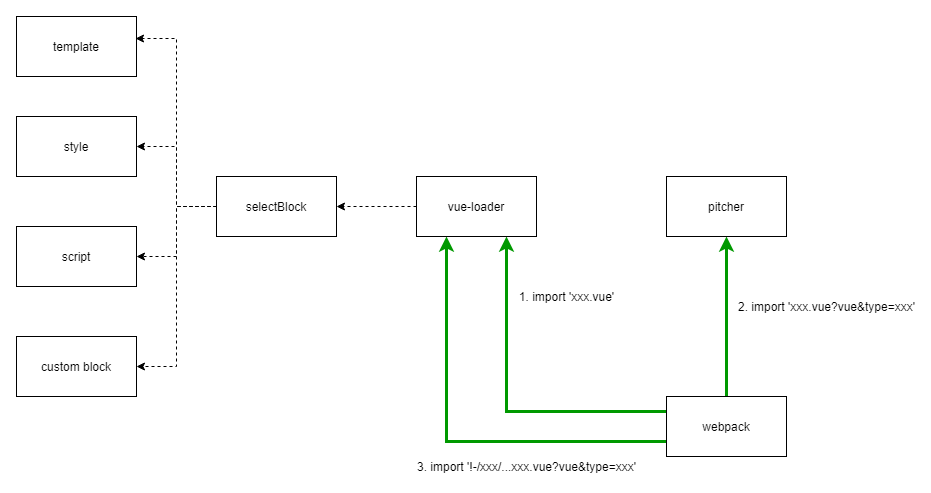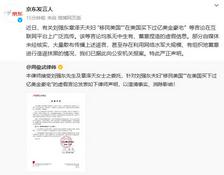两个问题:
- Vue SFC 文件包含多种格式的内容:style、script、template 以及自定义 block,vue-loader 如何分别处理这些内容?
- 针对不同内容块,vue-loader 如何复用其他 loader?比如针对 less 定义的 style 块,vue-loader 是怎么调用 less-loader 加载内容的?
OK,如果你不是特别清楚,那接着往下看吧,下面我们会拆开 vue-loader 的代码,看看 SFC 内容具体是怎么流转转换,顺便还能学学 webpack loader 的编写套路。
vue-loader[1] 主要包含三部分:
三者协作共同完成对 SFC 的处理,使用时需要用户同时注册 normal loader 和 plugin,简单示例:
const VueLoaderPlugin = require("vue-loader/lib/plugin");
module.exports = {
module: {
rules: [
{
test: /.vue$/,
use: [{ loader: "vue-loader" }],
}
],
},
plugins: [
new VueLoaderPlugin()
],
};运行过程可以粗略总结为两个阶段:
vue-loader 插件会在 apply 函数中扩展 webpack 配置信息核心代码如下:
class VueLoaderPlugin {
apply (compiler) {
// ...
const rules = compiler.options.module.rules
// ...
const clonedRules = rules
.filter(r => r !== rawVueRules)
.map((rawRule) => cloneRule(rawRule, refs))
// ...
// global pitcher (responsible for injecting template compiler loader & CSS
// post loader)
const pitcher = {
loader: require.resolve('./loaders/pitcher'),
resourceQuery: query => {
if (!query) { return false }
const parsed = qs.parse(query.slice(1))
return parsed.vue != null
}
// ...
}
// replace original rules
compiler.options.module.rules = [
pitcher,
...clonedRules,
...rules
]
}
}
function cloneRule (rawRule, refs) {
// ...
}
module.exports = VueLoaderPlugin注意,代码中 pitcher 对象的 resourceQuery[2] 属性是后续匹配的关键点,文章后面会展开讨论,这里先理解为“与 test 类似,用于匹配特定路径的函数”即可。
拆开来看,插件主要完成两个任务:
1 . 初始化 pitcher
如代码第 16 行,定义 pitcher 对象,指定 loader 路径为 require.resolve('./loaders/pitcher') ,并将 pitcher 注入到 rules 数组首位。
这种动态注入的好处是用户不用关注 —— 不去看源码根本不知道还有一个 pitcher loader,而且能保证 pitcher 能在其他 rule 之前执行,确保运行顺序。
2 . 复制 rules 列表
如代码第 8 行,plugin 中遍历 compiler.options.module.rules 数组,也就是用户提供的 webpack 配置中的 module.rules 项,对每个 rule 执行 cloneRule 方法复制规则对象。之后,将 webpack 配置修改为 [pitcher, ...clonedRules, ...rules] 。
感受一下实际效果,例如对于 rules 配置:
module.exports = {
module: {
rules: [
{
test: /.vue$/i,
use: [{ loader: "vue-loader" }],
},
{
test: /.css$/i,
use: [MiniCssExtractPlugin.loader, "css-loader"],
},
{
test: /.js$/i,
exclude: /node_modules/,
use: {
loader: "babel-loader",
options: {
presets: [["@babel/preset-env", { targets: "defaults" }]],
},
},
},
],
},
plugins: [
new VueLoaderPlugin(),
new MiniCssExtractPlugin({ filename: "[name].css" }),
],
};这里定义了三个 rule,分别对应 vue、js、css 文件。经过 plugin 转换之后的结果大概为:
module.exports = {
module: {
rules: [
{
loader: "/node_modules/vue-loader/lib/loaders/pitcher.js",
resourceQuery: () => {},
options: {},
},
{
resource: () => {},
resourceQuery: () => {},
use: [
{
loader: "/node_modules/mini-css-extract-plugin/dist/loader.js",
},
{ loader: "css-loader" },
],
},
{
resource: () => {},
resourceQuery: () => {},
exclude: /node_modules/,
use: [
{
loader: "babel-loader",
options: {
presets: [["@babel/preset-env", { targets: "defaults" }]],
},
ident: "clonedRuleSet-2[0].rules[0].use",
},
],
},
{
test: /.vue$/i,
use: [
{ loader: "vue-loader", options: {}, ident: "vue-loader-options" },
],
},
{
test: /.css$/i,
use: [
{
loader: "/node_modules/mini-css-extract-plugin/dist/loader.js",
},
{ loader: "css-loader" },
],
},
{
test: /.vue$/i,
exclude: /node_modules/,
use: [
{
loader: "babel-loader",
options: {
presets: [["@babel/preset-env", { targets: "defaults" }]],
},
ident: "clonedRuleSet-2[0].rules[0].use",
},
],
},
],
},
};转换之后生成 6 个 rule,按定义的顺序分别为:
可以看到,第 2、3 项是从开发者提供的配置中复制过来的,内容相似,只是 cloneRule 在复制过程会给这些规则重新定义 resourceQuery 函数:
function cloneRule (rawRule, refs) {
const rules = ruleSetCompiler.compileRules(`clonedRuleSet-${++uid}`, [{
rules: [rawRule]
}], refs)
const conditions = rules[0].rules
.map(rule => rule.conditions)
// shallow flat
.reduce((prev, next) => prev.concat(next), [])
// ...
const res = Object.assign({}, rawRule, {
resource: resources => {
currentResource = resources
return true
},
resourceQuery: query => {
if (!query) { return false }
const parsed = qs.parse(query.slice(1))
if (parsed.vue == null) {
return false
}
if (!conditions) {
return false
}
// 用import路径的lang参数测试是否适用于当前rule
const fakeResourcePath = `${currentResource}.${parsed.lang}`
for (const condition of conditions) {
// add support for resourceQuery
const request = condition.property === 'resourceQuery' ? query : fakeResourcePath
if (condition && !condition.fn(request)) {
return false
}
}
return true
}
})
// ...
return res
}cloneRule 内部定义的 resourceQuery 函数对应 module.rules.resourceQuery[3] [4]配置项,与我们经常用的 test 差不多,都用于判断资源路径是否适用这个 rule。这里 resourceQuery 核心逻辑就是取出路径中的 lang 参数,伪造一个以 lang 结尾的路径,传入 rule 的 condition 中测试路径名对该 rule 是否生效,例如下面这种会命中 /.js$/i 规则:
import script from "./index.vue?vue&type=script&lang=js&"
Vue-loader 正是基于这个规则,为不同内容块 (css/js/template) 匹配、复用用户所提供的 rule 设置。
插件处理完配置,webpack 运行起来之后,vue SFC 文件会被多次传入不同的 loader,经历多次中间形态变换之后才产出最终的 js 结果,大致上可以分为如下步骤:
过程大致为:

// 原始代码
import xx from './index.vue';
// 第一步,命中 vue-loader,转换为:
import { render, staticRenderFns } from "./index.vue?vue&type=template&id=2964abc9&scoped=true&"
import script from "./index.vue?vue&type=script&lang=js&"
export * from "./index.vue?vue&type=script&lang=js&"
import style0 from "./index.vue?vue&type=style&index=0&id=2964abc9&scoped=true&lang=css&"
// 第二步,命中 pitcher,转换为:
export * from "-!../../node_modules/vue-loader/lib/loaders/templateLoader.js??vue-loader-options!../../node_modules/vue-loader/lib/index.js??vue-loader-options!./index.vue?vue&type=template&id=2964abc9&scoped=true&"
import mod from "-!../../node_modules/babel-loader/lib/index.js??clonedRuleSet-2[0].rules[0].use!../../node_modules/vue-loader/lib/index.js??vue-loader-options!./index.vue?vue&type=script&lang=js&";
export default mod; export * from "-!../../node_modules/babel-loader/lib/index.js??clonedRuleSet-2[0].rules[0].use!../../node_modules/vue-loader/lib/index.js??vue-loader-options!./index.vue?vue&type=script&lang=js&"
export * from "-!../../node_modules/mini-css-extract-plugin/dist/loader.js!../../node_modules/css-loader/dist/cjs.js!../../node_modules/vue-loader/lib/loaders/stylePostLoader.js!../../node_modules/vue-loader/lib/index.js??vue-loader-options!./index.vue?vue&type=style&index=0&id=2964abc9&scoped=true&lang=css&"
// 第三步,根据行内路径规则按序调用loader每一步的细节,请继续往下看。
1 . 第一次执行 vue-loader
在运行阶段,根据配置规则, webpack 首先将原始的 SFC 内容传入 vue-loader,例如对于下面的代码:
// main.js
import xx from 'index.vue';
// index.vue 代码
<template>
<div class="root">hello world</div>
</template>
<script>
export default {
data() {},
mounted() {
console.log("hello world");
},
};
</script>
<style scoped>
.root {
font-size: 12px;
}
</style>此时第一次执行 vue-loader ,执行如下逻辑:
对于上述 index.vue 内容,转换结果为:
import { render, staticRenderFns } from "./index.vue?vue&type=template&id=2964abc9&scoped=true&"
import script from "./index.vue?vue&type=script&lang=js&"
export * from "./index.vue?vue&type=script&lang=js&"
import style0 from "./index.vue?vue&type=style&index=0&id=2964abc9&scoped=true&lang=css&"
/* normalize component */
import normalizer from "!../../node_modules/vue-loader/lib/runtime/componentNormalizer.js"
var component = normalizer(
script,
render,
staticRenderFns,
false,
null,
"2964abc9",
null
)
...
export default component.exports注意,这里并没有真的处理 block 里面的内容,而是简单地针对不同类型的内容块生成 import 语句:
这些路径都对应原始的 .vue 路径基础上增加了 vue 标志符及 type、lang 等参数。
2 . 执行 pitcher
如前所述,vue-loader 插件会在预处理阶段插入带 resourceQuery 函数的 pitcher 对象:
const pitcher = {
loader: require.resolve('./loaders/pitcher'),
resourceQuery: query => {
if (!query) { return false }
const parsed = qs.parse(query.slice(1))
return parsed.vue != null
}
}其中, resourceQuery 函数命中 xx.vue?vue 格式的路径,也就是说上面 vue-loader 转换后的 import 路径会被 pitcher 命中,做进一步处理。pitcher 的逻辑比较简单,做的事情也只是转换 import 路径:
const qs = require('querystring')
...
const dedupeESLintLoader = loaders => {...}
const shouldIgnoreCustomBlock = loaders => {...}
// 正常的loader阶段,直接返回结果
module.exports = code => code
module.exports.pitch = function (remainingRequest) {
const options = loaderUtils.getOptions(this)
const { cacheDirectory, cacheIdentifier } = options
// 关注点1: 通过解析 resourceQuery 获取loader参数
const query = qs.parse(this.resourceQuery.slice(1))
let loaders = this.loaders
// if this is a language block request, eslint-loader may get matched
// multiple times
if (query.type) {
// if this is an inline block, since the whole file itself is being linted,
// remove eslint-loader to avoid duplicate linting.
if (/.vue$/.test(this.resourcePath)) {
loaders = loaders.filter(l => !isESLintLoader(l))
} else {
// This is a src import. Just make sure there's not more than 1 instance
// of eslint present.
loaders = dedupeESLintLoader(loaders)
}
}
// remove self
loaders = loaders.filter(isPitcher)
// do not inject if user uses null-loader to void the type (#1239)
if (loaders.some(isNullLoader)) {
return
}
const genRequest = loaders => {
...
}
// Inject style-post-loader before css-loader for scoped CSS and trimming
if (query.type === `style`) {
const cssLoaderIndex = loaders.findIndex(isCSSLoader)
if (cssLoaderIndex > -1) {
...
return query.module
? `export { default } from ${request}; export * from ${request}`
: `export * from ${request}`
}
}
// for templates: inject the template compiler & optional cache
if (query.type === `template`) {
...
// console.log(request)
// the template compiler uses esm exports
return `export * from ${request}`
}
// if a custom block has no other matching loader other than vue-loader itself
// or cache-loader, we should ignore it
if (query.type === `custom` && shouldIgnoreCustomBlock(loaders)) {
return ``
}
const request = genRequest(loaders)
return `import mod from ${request}; export default mod; export * from ${request}`
}核心功能是遍历用户定义的 rule 数组,拼接出完整的行内引用路径,例如:
// 开发代码:
import xx from 'index.vue'
// 第一步,通过vue-loader转换成带参数的路径
import script from "./index.vue?vue&type=script&lang=js&"
// 第二步,在 pitcher 中解读loader数组的配置,并将路径转换成完整的行内路径格式
import mod from "-!../../node_modules/babel-loader/lib/index.js??clonedRuleSet-2[0].rules[0].use!../../node_modules/vue-loader/lib/index.js??vue-loader-options!./index.vue?vue&type=script&lang=js&";3 . 第二次执行 vue-loader
通过上面 vue-loader -> pitcher 处理后,会得到一个新的行内路径,例如:
import mod from "-!../../node_modules/babel-loader/lib/index.js??clonedRuleSet-2[0].rules[0].use!../../node_modules/vue-loader/lib/index.js??vue-loader-options!./index.vue?vue&type=script&lang=js&";
以这个 import 语句为例,之后 webpack 会按照下述逻辑运行:
这就给了 vue-loader 第二次执行的机会,再回过头来看看 vue-loader 的代码:
module.exports = function (source) {
// ...
const {
target,
request,
minimize,
sourceMap,
rootContext,
resourcePath,
resourceQuery = "",
} = loaderContext;
// ...
const descriptor = parse({
source,
compiler: options.compiler || loadTemplateCompiler(loaderContext),
filename,
sourceRoot,
needMap: sourceMap,
});
// if the query has a type field, this is a language block request
// e.g. foo.vue?type=template&id=xxxxx
// and we will return early
if (incomingQuery.type) {
return selectBlock(
descriptor,
loaderContext,
incomingQuery,
!!options.appendExtension
);
}
//...
return code;
};
module.exports.VueLoaderPlugin = plugin;第二次运行时由于路径已经带上了 type 参数,会命中上面第 26 行的判断语句,进入 selectBlock 函数,这个函数的逻辑很简单:
module.exports = function selectBlock (
descriptor,
loaderContext,
query,
appendExtension
) {
// template
if (query.type === `template`) {
if (appendExtension) {
loaderContext.resourcePath += '.' + (descriptor.template.lang || 'html')
}
loaderContext.callback(
null,
descriptor.template.content,
descriptor.template.map
)
return
}
// script
if (query.type === `script`) {
if (appendExtension) {
loaderContext.resourcePath += '.' + (descriptor.script.lang || 'js')
}
loaderContext.callback(
null,
descriptor.script.content,
descriptor.script.map
)
return
}
// styles
if (query.type === `style` && query.index != null) {
const style = descriptor.styles[query.index]
if (appendExtension) {
loaderContext.resourcePath += '.' + (style.lang || 'css')
}
loaderContext.callback(
null,
style.content,
style.map
)
return
}
// custom
if (query.type === 'custom' && query.index != null) {
const block = descriptor.customBlocks[query.index]
loaderContext.callback(
null,
block.content,
block.map
)
return
}
}就只是根据 type 参数返回不能内容。
OK,到这里我们可以解答文章最开始提到的问题:
1 . Vue SFC 文件包含多种格式的内容:style、script、template 以及自定义 block,vue-loader 如何分别处理这些内容?
在 vue-loader 中,给原始文件路径增加不同的参数,后续配合 resourceQuery 函数就可以分开处理这些内容,这样的实现相比于一次性处理,逻辑更清晰简洁,更容易理解
2 . 针对不同内容块,vue-loader 如何复用其他 loader?比如针对 less 定义的 style 块,vue-loader 是怎么调用 less-loader 加载内容的?
经过 normal loader、pitcher loader 两个阶段后,SFC 内容会被转化为 import xxx from '!-babel-loader!vue-loader?xxx' 格式的引用路径,以此复用用户配置。
此外,从 vue-loader 可以学到一些 webpack 插件、loader 的套路:
[1]vue-loader: https://vue-loader.vuejs.org/
[2]resourceQuery: https://webpack.js.org/configuration/module/#ruleresourcequery
[3]module.rules.resourceQuery: https://webpack.js.org/configuration/module/#ruleresourcequery
[4]https://webpack.js.org/configuration/module/#ruleresourcequery
本文由哈喽比特于4年以前收录,如有侵权请联系我们。
文章来源:https://mp.weixin.qq.com/s/Pvxr0A-aDoitL1UAokTSnQ
京东创始人刘强东和其妻子章泽天最近成为了互联网舆论关注的焦点。有关他们“移民美国”和在美国购买豪宅的传言在互联网上广泛传播。然而,京东官方通过微博发言人发布的消息澄清了这些传言,称这些言论纯属虚假信息和蓄意捏造。
日前,据博主“@超能数码君老周”爆料,国内三大运营商中国移动、中国电信和中国联通预计将集体采购百万台规模的华为Mate60系列手机。
据报道,荷兰半导体设备公司ASML正看到美国对华遏制政策的负面影响。阿斯麦(ASML)CEO彼得·温宁克在一档电视节目中分享了他对中国大陆问题以及该公司面临的出口管制和保护主义的看法。彼得曾在多个场合表达了他对出口管制以及中荷经济关系的担忧。
今年早些时候,抖音悄然上线了一款名为“青桃”的 App,Slogan 为“看见你的热爱”,根据应用介绍可知,“青桃”是一个属于年轻人的兴趣知识视频平台,由抖音官方出品的中长视频关联版本,整体风格有些类似B站。
日前,威马汽车首席数据官梅松林转发了一份“世界各国地区拥车率排行榜”,同时,他发文表示:中国汽车普及率低于非洲国家尼日利亚,每百户家庭仅17户有车。意大利世界排名第一,每十户中九户有车。
近日,一项新的研究发现,维生素 C 和 E 等抗氧化剂会激活一种机制,刺激癌症肿瘤中新血管的生长,帮助它们生长和扩散。
据媒体援引消息人士报道,苹果公司正在测试使用3D打印技术来生产其智能手表的钢质底盘。消息传出后,3D系统一度大涨超10%,不过截至周三收盘,该股涨幅回落至2%以内。
9月2日,坐拥千万粉丝的网红主播“秀才”账号被封禁,在社交媒体平台上引发热议。平台相关负责人表示,“秀才”账号违反平台相关规定,已封禁。据知情人士透露,秀才近期被举报存在违法行为,这可能是他被封禁的部分原因。据悉,“秀才”年龄39岁,是安徽省亳州市蒙城县人,抖音网红,粉丝数量超1200万。他曾被称为“中老年...
9月3日消息,亚马逊的一些股东,包括持有该公司股票的一家养老基金,日前对亚马逊、其创始人贝索斯和其董事会提起诉讼,指控他们在为 Project Kuiper 卫星星座项目购买发射服务时“违反了信义义务”。
据消息,为推广自家应用,苹果现推出了一个名为“Apps by Apple”的网站,展示了苹果为旗下产品(如 iPhone、iPad、Apple Watch、Mac 和 Apple TV)开发的各种应用程序。
特斯拉本周在美国大幅下调Model S和X售价,引发了该公司一些最坚定支持者的不满。知名特斯拉多头、未来基金(Future Fund)管理合伙人加里·布莱克发帖称,降价是一种“短期麻醉剂”,会让潜在客户等待进一步降价。
据外媒9月2日报道,荷兰半导体设备制造商阿斯麦称,尽管荷兰政府颁布的半导体设备出口管制新规9月正式生效,但该公司已获得在2023年底以前向中国运送受限制芯片制造机器的许可。
近日,根据美国证券交易委员会的文件显示,苹果卫星服务提供商 Globalstar 近期向马斯克旗下的 SpaceX 支付 6400 万美元(约 4.65 亿元人民币)。用于在 2023-2025 年期间,发射卫星,进一步扩展苹果 iPhone 系列的 SOS 卫星服务。
据报道,马斯克旗下社交平台𝕏(推特)日前调整了隐私政策,允许 𝕏 使用用户发布的信息来训练其人工智能(AI)模型。新的隐私政策将于 9 月 29 日生效。新政策规定,𝕏可能会使用所收集到的平台信息和公开可用的信息,来帮助训练 𝕏 的机器学习或人工智能模型。
9月2日,荣耀CEO赵明在采访中谈及华为手机回归时表示,替老同事们高兴,觉得手机行业,由于华为的回归,让竞争充满了更多的可能性和更多的魅力,对行业来说也是件好事。
《自然》30日发表的一篇论文报道了一个名为Swift的人工智能(AI)系统,该系统驾驶无人机的能力可在真实世界中一对一冠军赛里战胜人类对手。
近日,非营利组织纽约真菌学会(NYMS)发出警告,表示亚马逊为代表的电商平台上,充斥着各种AI生成的蘑菇觅食科普书籍,其中存在诸多错误。
社交媒体平台𝕏(原推特)新隐私政策提到:“在您同意的情况下,我们可能出于安全、安保和身份识别目的收集和使用您的生物识别信息。”
2023年德国柏林消费电子展上,各大企业都带来了最新的理念和产品,而高端化、本土化的中国产品正在不断吸引欧洲等国际市场的目光。
罗永浩日前在直播中吐槽苹果即将推出的 iPhone 新品,具体内容为:“以我对我‘子公司’的了解,我认为 iPhone 15 跟 iPhone 14 不会有什么区别的,除了序(列)号变了,这个‘不要脸’的东西,这个‘臭厨子’。









